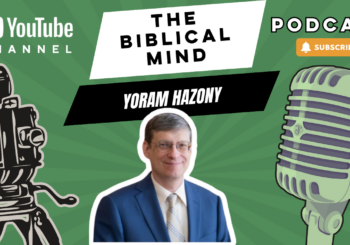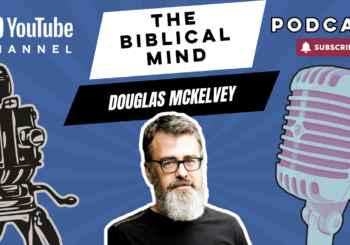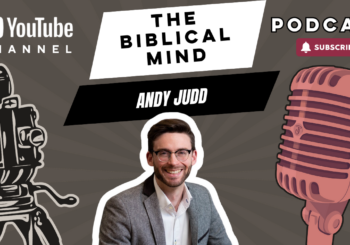Part of the Purifying Ourselves: Moral Formation in the Bible series
Becoming Disciples: Moral Formation as Gift and Task
This piece is derived from research for a new book on discipleship oriented toward justice (IVP Academic, forthcoming). For the longer, more academic argument, see Michael J. Rhodes, “Becoming Militants of Reconciling Love: 1 John 3:1-3 and the Task of Ethical Formation,” Journal of Theological Interpretation 15.2 (2021).
Discipleship is all about becoming: becoming followers of Jesus, becoming people whose character conforms to his, becoming communities that serve as outposts of his just, generous kingdom. Discipleship is the intentional, often difficult journey of growing up into our identity and vocation as God’s image bearers through lives lived in union with the One who is “the image of the invisible God, the firstborn of all creation” (Colossians 1:15).
Enjoying this article? Read more from The Biblical Mind.
And yet for all our talk about discipleship, when we take a closer look at our churches—and when we take a closer look at ourselves—the results don’t always appear very promising. Our headlines and newsfeeds are filled with stories of church scandals, moral failures, and fallen Christian leaders. We watch as these discipleship failures drag Jesus’ name through the mud, and drive large numbers of would-be disciples out of the faith altogether. If we’re honest, we also see similar discipleship failures in our own lives.
Maybe it’s because I’ve lost two family members to Alzheimer’s, but I’ve been thinking about forgetting lately. In the early stages of the disease, we can relate to our loved ones. Who hasn’t forgotten someone else’s name, or where they parked their car? But as this disease progresses, we watch our loved ones forget ever more central realities, until eventually answering questions like, “Who am I?” “Where am I?” and “When am I?” becomes impossible. At this stage, our loved ones are often alienated not only from us, but also from themselves.
Perhaps our failures at discipleship are grounded in an Alzheimer’s-like forgetfulness of the basic facts of our lives with Jesus. The difference, of course, is that the person with Alzheimer’s is the victim of an invading disease. Too often, we have willingly embraced such forgetfulness. Reclaiming discipleship, then, requires us to remember how to live the most basic sorts of questions, questions like:
- Who are we as disciples?
- Where are we as disciples?
- When are we as disciples?
One essential guide for this journey of remembering and living is John. When the beloved disciple penned a letter to encourage some of the world’s first Christians, he offered us one of the most powerful statements on the “who, where, and when” of discipleship in all of Scripture. His answers to each of these questions are grounded in God’s generous gift of discipleship to God’s children. But as we will see, that gift of discipleship includes and entails the task of discipleship, our willing embrace of the journey of becoming.
Who Are We?
“Look at what sort of love the Father has given to us, that we might be called children of God—and we are!” (1 John 3:1a)
For John, the life of discipleship begins by marveling at a mystery: we are God’s children. This identity belongs to us for one reason and one reason only. The Father loves us. The final phrase of v. 1 makes John sound like someone sharing news that seems too-good-to-be-true. “We’re called God’s children! And we really are! Can you believe it?”
But of course, one way even strangers can tell a child is related to their parents is that child and parent share a family resemblance. In the run up to John’s excited outburst in 3:1, the beloved disciple makes this exact point: “If you know that God is ‘righteous,’ [or ‘just’] you know that anybody who practices righteousness [or ‘justice’] has been born of him” (2:29). Being a child of God, then, is all about what we might call moral discipleship, about the character of our lives as members of God’s family. For John, the first thing to say about our moral and spiritual identities as disciples is that we are God’s children, born into a life of justice, righteousness, and love that is ours based solely on the Father’s gracious love.
Where Are We?
“Because of this the world does not know us, because it did not know him.” (1 Jn 3:1b)
In the case of disciples, though, our family resemblance with God is actually the source of some confusion. Because the “world” does not know Jesus, they do not recognize his children. In making this point, John implies an answer to our question about the “where” of discipleship: disciples are in the “world” (the Greek word is kosmos).
We might think that this is a pretty obvious, even trivial, answer to the “where” question. We would be wrong. For John, “world” is one of those thick, theological words, a word he unpacks in his Gospel and letters in at least three different ways. Understanding the complexity of what John means by the “world” is essential if we want to grasp what it might mean to suggest that discipleship takes place in it.
Most basically, John can refer to the “world” as creation, created by the Father through the Son (cf. Jn 1:1, 10). We glimpse the materiality of John’s conception of the “world” in his reference to the “world’s goods” that can be used to help others in 1 Jn 3:17.
But secondly, and more prominently in 1 John, the “world” also refers to God’s good world in rebellion against him. In this sense, the “world” can refer to sinful humanity, as in 1 Jn 3:1b. But God’s good creation has also become a cosmic battleground, and for John, humans aren’t the only combatants. “The whole world,” John writes in 1 Jn 5:19b, “lies under the power of the evil one.”
Indeed, because of the Devil’s attempt at a hostile takeover of God’s world, for John, human beings are always already caught up in the cosmic battle. There is no neutral space. All humanity is claimed humanity.1This language is drawn from Philip Ziegler, Militant Grace: The Apocalyptic Turn and the Future of Christian Theology (Grand Rapids: Baker Academic, 2018), 10. On one side, all of humanity starts out as “children of the devil” aligned with the “world” in its rebellion against God. On the other side, the “children of God” are those who have been liberated from the Devil’s hostile influence by the Father’s lavish love.
It’s important that we don’t reduce this second, supremely negative sense of the “world” to spiritual realities only. John seems to suggest that creation, human individuals, and cultural life more generally have all become hostile to God. When John speaks of a “world” that disciples must not love in 1 Jn 2:16, he speaks of “the lust of the flesh, and the lust of the eyes, and the pride of possessions” as that which is not from the Father but from the “world.” Here, to love the “world” is to be caught up in social, cultural, and economic systems that are bent away from the Father’s creational purposes and toward the Devil’s demonic ones. Wink captures something of this in his translation of “the world” as “the System.”2Walter Wink, Engaging the Powers: Discernment and Resistance in a World of Domination (Minneapolis: Fortress, 1992), 55–57.
But finally and most fundamentally, this rebellious “world” is also the “world” that God loves, loves to such an extent that he gave his only Son to save it (Jn 3:16). The good news of the gospel, the good news that makes discipleship possible, is that God refuses to give up on his good creation. Jesus, the Son of God, “was revealed for this purpose, to destroy the works of the Devil” (1 Jn 3:8b, NRSV). Because of God’s love for the “world,” “children of the devil” are invited to transfer their allegiance and come into the light. “But if anyone does sin, we have an advocate with the Father, Jesus Christ the righteous; and he is the atoning sacrifice for our sins, and not for ours only but also for the sins of the whole world” (1 Jn 2:1b–2, NRSV).
So where are disciples? Disciples are in the world that God created, a world that, under the Devil’s dark influence, has holistically turned against God, a world that, despite everything, God will not give up on.
But John isn’t done sketching out the crucial claims of discipleship yet. There’s a final question to be answered.
When Are We as Disciples?
“Beloved, we are God’s children now, but it has not yet been revealed what we will be. We do know that when he is revealed, we will be like him, for we will see him as he is.” (1 Jn 3:2)
John answers the “when” question in a particularly provocative way. Already, right now, at the very moment that you’re reading this, you are God’s children. But, John reminds us in the same breath, we are not yet what we will become.
Discipleship takes place between John’s “already children” and his “not yet what we will be.” Disciples are on a journey of becoming. But that journey will not, indeed cannot, come to an end until Jesus is revealed at his second coming. Maybe even more astoundingly, we can’t even know fully what it will mean to become the disciples whom God has made us to be. Partial progress towards and partial understanding of discipleship are a fixed feature of our lives as disciples in the time between the “already” and the “not yet.” Why?
Because to be a disciple of Jesus is to be like Jesus, and in this life we cannot yet see him finally and fully as he is. When he returns, we will. By beholding the face of Jesus truly, we will not only see our destiny. We will become our destiny.
John’s answers to our “who,” “where,” and “when” questions relentlessly draw our attention to this fact: the disciple’s life is built on grace. The Father rescues the Devil’s children, makes them his own, and promises to make them fully what they are meant to be when his Son returns. Discipleship is a gift.
Discipleship and the Task of Becoming
All of which makes what John says next very confusing.
“And everyone who has this hope in [Jesus] purifies themselves as [Jesus] is pure.” (1 Jn 3:3).
Wait . . . what?
If the gift of becoming disciples is all God’s work, how can John immediately turn around and give that work right back to disciples? The language of God’s people purifying themselves sounds downright heretical to many of us. Shouldn’t the life of faith, a life that John has described as the life of righteousness and love, spring forth naturally and without effort from those who have been given the gift of discipleship?
Not for John. For John, the gift of discipleship carries with it the task of actively and strenuously seeking to become the disciples God desires, the disciples we will become when our Lord Jesus returns. Enslaved by the Devil’s dark influence, discipleship was impossible. Liberated by Jesus’ love for the “world,” discipleship becomes a glorious possibility, and indeed, a divinely given responsibility.
John gives us lots of ideas about what actively embracing the task of discipleship might look like. For starters, the fact that John tells us that Jesus will one day transform us by allowing us to see him “as he is” suggests that we embrace the task of discipleship today by gazing on our Lord in the present.
For most of us, actively engaging in spiritual disciplines like prayer, Scripture study, worshiping together with God’s people, and receiving the sacraments takes work. We don’t always feel like giving ourselves to the task of gazing on Jesus in these ways. But these disciplines allow us to look to Jesus. As we gaze on Jesus, and see in him the image of what we will one day become, we develop what Augustine called a “holy desire.”
This holy desire drives us to actively, strenuously embrace the task of discipleship in other ways. Having gazed on the glory of Jesus, we seek to imitate him. “We know love by this,” John writes, “that Jesus laid down his life for us—and we ought to lay down our lives for one another” (1 Jn 3:16).
Imitating Jesus, though, requires us to actively put to death those habits and tendencies that we’ve acquired through life lived in a “world” that has been deeply, deformingly influenced by the Devil. This is the point John makes in 2:15. Though in Jesus we have “overcome the Evil One,” the beloved disciple nevertheless must warn us not to “love the ‘world'” or “the things in the ‘world.'” As we have seen, the “world” here doesn’t refer to God’s good creation, but to that creation as it has been corrupted by the Devil’s influence. That “world” is passing away (2:17). So in the meantime, disciples must strive to rid themselves of the “lust of the flesh and the lust of the eyes and the pride of possessions” (2:16).
Loader points out that this particular catalogue of deforming habits focuses specifically on deformed dispositions around material wealth. Indeed, they are the kind of habits that the relatively wealthy in John’s community might find particularly enticing.3William Loader, “The Significance of 2:15–17 for Understanding the Ethics of John,” in Culpepper and Anderson, Communities in Dispute, 223–35. But however appealing these habits may be, from John’s perspective they’re deadly. They tie us to a “world” that is passing away, and that threatens to take us with it. These habits must be put to death.
But just as we actively put to death these habits, we need to raise others to life, and especially that sacrificial love embodied in Jesus’ willing death on the cross. Intentionally striving to embrace such sacrificial love can presumably be expressed in a whole variety of ways, but it’s interesting that in 1 John, the disciple only gives one concrete example:
We also ought to lay down our lives for our siblings. Whoever has the possessions of the world and sees his sibling in need and closes their hearts from them, how does the love of God remain in him? Children, let us not love in word nor in tongue, but in work and truth. (3:16b–18).
Not only does John make care for the poor the sole concrete example of what it looks like to imitate Jesus’s self-sacrificial love in the letter, he also speaks directly to the kind of rigorous, active discipleship required to do so. In 2:17, pride in possessions was a vice that had to be put to death. Here, “worldly possessions” are a tool to be used in care for the poor. Self-sacrificial love demands that we work hard at putting to death a certain stance towards “possessions of the world” and replacing it with another.
But we can say more. John homes in on the deep dispositions of the would-be disciple by focusing on a specific moment: the moment when a disciple sees their sibling in need and immediately confronts the temptation to purposely shut down their affections towards them.4The word I translated as “heart” above is actually splánchnon. In its literal usage, it refers to the inward parts of the body; in its metaphorical usage, to the center of a person’s feelings. If we give in to this temptation, then based on this “shutting down” of our affections, we will “shut down” our hands as well, refusing to give generously.
This is a temptation which we should be familiar with:
Every single day, Christians like me face the temptation to shut our hearts, and therefore our hands and our lives, to our brothers and sisters who are crying out in protests and in prison cells, members of God’s family living in slums created by oppressive zoning laws and attending schools segregated by design, siblings in Christ who fear for their safety even in interactions with those sworn to serve and protect.5Rhodes, “Becoming Lovers,” 32.
When we embrace this “shutting down” of our affections, we demonstrate that our attitude towards the poor and to possessions are out of line with the “love of God”—indeed, John goes so far as to wonder if that love can even be said to remain in us.
What is required is obviously for us to actively stir up the self-sacrificial love that we see in Jesus, and to pursue a whole-hearted practice of that love in “work and in truth.”
To take one final example, for John, living life within the church is another way that we proactively pursue discipleship. Indeed, John declares that when the church practices the mutual love of one another that they have received from God, God’s own love “is perfected,” or perhaps better, “attains its end” among them (1 Jn 4:11–12).6See David Rensberger, “Completed Love: 1 John 4:11–18 and the Mission of the New Testament Church,” in Culpepper and Anderson, Communities in Dispute, 249. Conversely, the church is also that community in which we support the discipleship of other disciples. Thus John envisions the church as a community where we are able to “see” our brothers’ and sisters’ sinful discipleship failures, and pray for them, claiming in faith God’s promise that he will give new life to them in response to our prayers (1 Jn 5:16).
Receiving the Gift, Embracing the Task
For John, our lives as disciples begin and end with God’s generous gift-giving. God makes us children solely out of the goodness of his heart and the power of his transforming love. But that transforming love is truly transformational. It frees us up to embrace, actively and strenuously, the task of discipleship.
John’s recognition that even God’s children will not be what we are meant to be until Jesus returns gives us some comfort in our discipleship failures. But John’s call that we purify ourselves by embracing the task of discipleship reminds us that the Christian life is never passive, automatic, or easy. We live in a battleground, after all. The good news of the gospel is that becoming who we are meant to be is both guaranteed by Jesus, and can be glimpsed in the present. That good news offers us hope for the future, and an agenda in the present, an agenda centered on the task of formative, moral discipleship.
The essays that follow in this series will explore what it means to practice and pursue moral formation, to seek to “purify ourselves as Jesus himself is pure.” They will highlight the way interdisciplinary research offers new insights into how exactly moral formation works. My hope is that by beginning with 1 John’s dizzying description of God’s gracious gift of discipleship, we will be better able to receive these insights and imagine how to apply them in embracing the task of discipleship in our world today.
Endnotes
1. This language is drawn from Philip Ziegler, Militant Grace: The Apocalyptic Turn and the Future of Christian Theology (Grand Rapids: Baker Academic, 2018), 10.
2. Walter Wink, Engaging the Powers: Discernment and Resistance in a World of Domination (Minneapolis: Fortress, 1992), 55–57.
3. William Loader, “The Significance of 2:15–17 for Understanding the Ethics of John,” in Culpepper and Anderson, Communities in Dispute, 223–35.
4. The word I translated as “heart” above is actually splánchnon. In its literal usage, it refers to the inward parts of the body; in its metaphorical usage, to the center of a person’s feelings.
5. Rhodes, “Becoming Lovers,” 32.
6. See David Rensberger, “Completed Love: 1 John 4:11–18 and the Mission of the New Testament Church,” in Culpepper and Anderson, Communities in Dispute, 249.
Image created by Rubner Durais
Did you enjoy this article? Check out The Biblical Mind podcast.





